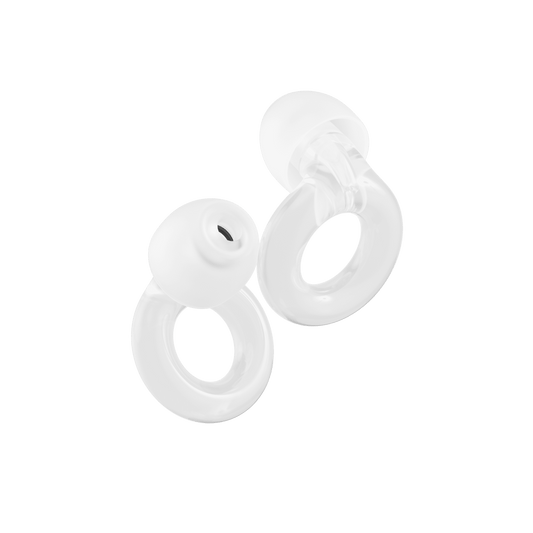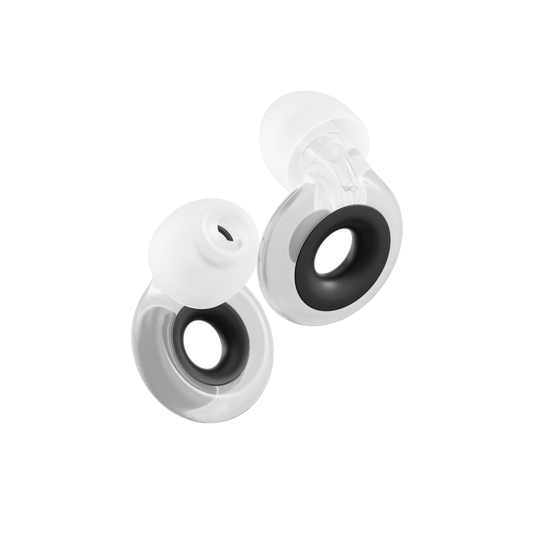The wind in your hair. The rumble of sheer power beneath you. The feeling of adventure and freedom. Adrenaline coursing through your veins. The damaged eardrums. The consistent high-pitched whine…
Wait a moment.
There’s no getting away from the fact that riding a motorcycle is thrilling. It’s a chance to hit the road and not look back. But it’s easy to forget that amongst all of the adrenaline and thrills, there’s the risk of long-term or permanent damage to your ears.
Now we’re not saying that you should stop riding your motorcycle – far from it. Instead, we’re here to give you some tips and tricks so that you can take steps to protect your hearing and ensure you don’t suffer for the pleasure of riding your bike.
How does riding a motorcycle damage your ears?
According to the Centers for Disease Control and Prevention (CDC), hearing damage can come from a singular, sharp exposure to any form of extremely loud noise, or any long exposure to high volumes.
When it comes to motorcycle hearing loss, it’s common for people to think that it’s only the noise from the engine and the exhaust that can damage your ears. And while they’re correct in the fact that these are key contributors, can wind also damage your ears?
The answer is absolutely, and in fact, the biggest risk to your ears is actually wind noise.
Now you may be thinking that your helmet alone can help protect you from the buffeting of the wind. But it’s a common occurrence for the wind to get inside your helmet and cause harm to your ears, and this can even happen at low speeds.


What happens to your ears when they’re exposed to loud noise?
Your ear is made up of three parts:
° The external ear canal – this channels the vibrations from sound into your ear
° The middle ear – which is made up of your eardrum, and the three small ear bones (malleus, incus, and stapes) which boost the sound vibrations
° The inner ear – an area filled with fluid and hair cells that turn the sound vibrations into electrical signals that are sent to the brain
When you are exposed to loud, sharp sounds, or prolonged exposure to high volumes, the hair cells can become overwhelmed and die.
Humans cannot regrow these hair cells, so the more cells that die due to high volumes, the more you will start to lose your hearing.
Noise can also damage your auditory nerve, which can lead to auditory issues such as struggling to understand speech.
Can riding a motorcycle cause tinnitus?
You know that feeling when your ears are ringing after your bike ride?
That’s called tinnitus.
Hearing loss and tinnitus go hand in hand.
Both of these afflictions are a result of prolonged exposure to high levels of noise, or a sudden, sharp noise. They can also both be permanent and irreversible – so they must be taken seriously.
Tinnitus can occur in a similar way to hearing loss. When your inner ear cells die, the neuron pathway from the ear is altered. This tricks the brain into thinking that there is a high-pitched ringing sound, which subsequently causes you to consistently hear one.
It has been proven that riding a motorcycle without adequate ear protection is one of the many direct causes of tinnitus, with many lifetime motorcycle riders being afflicted with this condition.
How many decibels is a motorcycle?
The common consensus among countries around the world is that any noise above 85 dB can be considered dangerous.
Now when we take into consideration that the average decibel level of a motorcycle going 35 miles per hour (56 km/hour) or less is 78 dB, you can see that the noise level is already bordering on being dangerous.
Also, the faster you go on your motorcycle the louder it becomes, meaning that number will start to increase. For example, when you get up to a speed of 65 miles per hour (104 km/hour), the noise levels can increase to around 115 dB.
And then if you take the wind noise into account, you can start to see why riding a motorcycle takes such a toll on the health of your ears.
How can you protect your ears when riding a motorcycle?


Now that you know the dangers associated with riding your motorcycle, you are probably wondering how you can take action and reduce the chances of suffering hearing damage.
As we mentioned previously, motorcycle helmet ear protection is sorely lacking – mainly due to the fact that the noise levels under a helmet can still easily reach above 110 dB.
However, studies have shown that the typical helmet can decrease the decibel level by around 7 to 10 dB – meaning they have a role to play in protecting your ears, as well as being an effective safety measure for keeping your head safe and secure.
You can also slightly decrease the sound levels by wearing something like a balaclava or a scarf under your helmet. The thick material of the headwear can help to filter and soften the sound, therefore reducing the damage to your ears – especially if the material is also tucked into your clothes.
Another effective way to reduce sound is to fit your helmet with a visor.
A properly fitted visor can go some way toward helping to protect your ears from head-on winds – plus, as an added bonus, it helps to protect your face from debris and rainfall when riding your bike.
However, when it comes to motorcycle ear protection, the most effective way to combat the high levels of noise is by wearing earplugs.
Should you wear earplugs when riding a motorcycle?
The good news is that insomnia is usually treatable. Here are some things you can do to tackle it:
Change lifestyle habits, e.g., improve your diet, eliminate naps, etc.
You may be thinking, “I have a good helmet with a strong visor and I even have a balaclava, so do I need earplugs when I’m riding my motorcycle?”
The short answer is yes.
The longer answer is that earplugs can make a huge difference to the overall health of your ears if you regularly ride a motorcycle.
Even if you own a helmet that is specifically designed to reduce drag and noise levels, having properly fitted earplugs gives you an extra layer of protection. At the end of the day, they can actually be the difference between suffering from long-term or permanent ear damage and keeping your ears safe.
Simply put, there is no helmet out there that will eliminate the need for a quality pair of earplugs.


Does wearing earplugs prevent me from hearing traffic?
It is generally accepted that motorcycle riders should not wear any form of earplugs that affect their ability to communicate, as well as hear traffic and warning signals such as emergency vehicle sirens.
For example, in the United Kingdom, the HSE recommends that any protection that reduces the level at the ear to below 70 dB should be avoided. This is because by filtering out noise to this extent, riders can become isolated from their environment – leading to a number of safety risks for both yourself and other drivers.
However, earplugs such as Loop Experience Plus (Pro) are specifically designed to reduce noise levels by 23 dB across low, mid, and high frequencies, whilst also filtering the noise to allow you to still hear your surroundings.
These features ensure that you can reduce harmful levels of noise whilst also not putting yourself or other people on the road at risk.
Don’t suffer for your love of motorcycles
For many people around the world, riding a motorcycle is one of the true pleasures of life. But you shouldn’t have to suffer for this love, and potentially lose your ability to properly hear and communicate with others.
By taking some easily implemented precautionary measures, you can still ride your motorcycle without the negative effects that so often come with it.
Earplugs for motorcycle riders are one of the most effective ways you can protect your hearing. When you’re riding a motorcycle with earplugs, you are reducing the decibel level that your ears are exposed to and protecting your hearing for the years to come.
To find out more about how Loop can help you protect your hearing, make sure to take a look at our range of decibel-lowering earplugs – perfect for keeping your ears safe, and your motorcycle rides quieter.




































